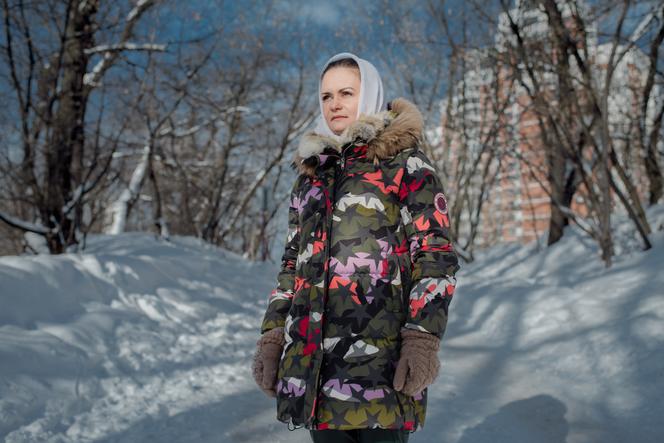


Amid a forest of blue uniforms, she's the only one that stands out: With a white scarf on her head as a rallying symbol, her tiny frame up against the imposing size of the police officers. On Saturday, February 3, the police had just arrested several journalists and participants in the weekly protest action by groups of "soldiers' wives," calling for the return of their husbands, sons and brothers from the Ukrainian front.
Standing 1.55 meters tall, Andreeva stood alone in front of the police van, preventing the vehicle from moving. She was pleading for each of the demonstrators, trying to wrest them from the officers' clutches. To no avail: All were detained for several hours and forced to sign a statement of commitment to never again take part in any "illegal actions."
Such is the course of the war in Ukraine, which reveals people's characters, even those far from the front lines. Trained as a pediatrician, the 34-year-old Muscovite woman had never previously been involved in activism or demonstrations, let alone led any kind of protest. Yet there she was, suddenly transformed into the figurehead of a movement that, fragile though it may be, has been troubling the Russian authorities.
"If, by some misfortune, something were to happen to my husband, I'd blame myself for not having done my utmost to get him out of there," she said, summing up her commitment. "Besides, my little girl has a grandmother..." This meant that if Andreeva were to go to prison, her two-and-a-half-year-old daughter, deprived of her father and mother, would not be left to fend for herself.
The "girls," as they call each other, are no less cautious. For months, they have been content to write to MPs and ministries, and to sign petitions. "I have a whole collection of acknowledgments of receipt," Andreeva said, referring to the authorities' embarrassment over these initiatives. They organize themselves mainly on Telegram, in groups called "The Way Back."
They have also taken great care to remain within the law, and to pledge their loyalty. They haven't called for an end to the "special military operation," but for it to be led by volunteers, and not by the 300,000 civilians who were mobilized from the military reserves in the fall of 2022. As early as December of that year, Russian Defense Minister Sergei Shoigu had committed to this, referring to it as a "priority," but although the authorities have boasted of an exceptionally high number of recruits (385,000 for 2023, officially), the return of the mobilized reservists is out of the question.
You have 75% of this article left to read. The rest is for subscribers only.
